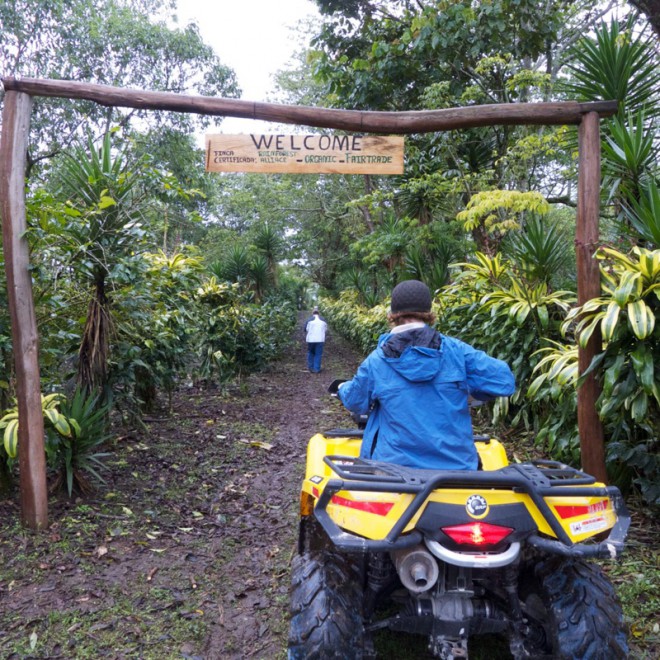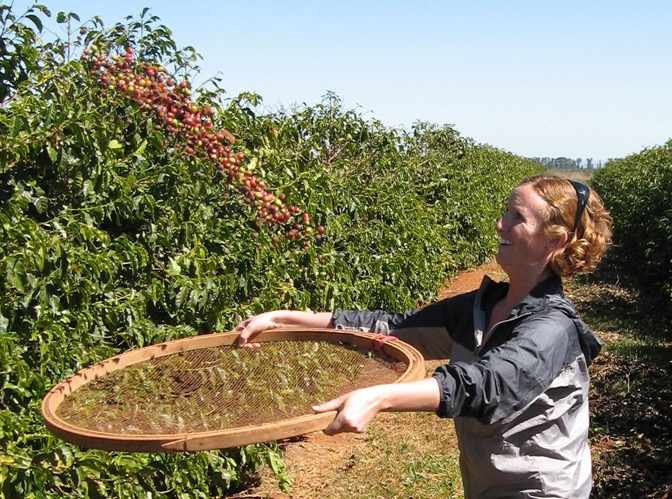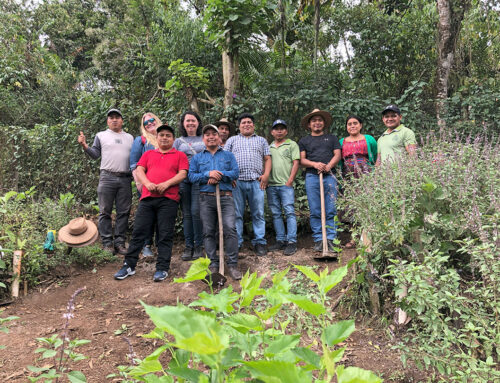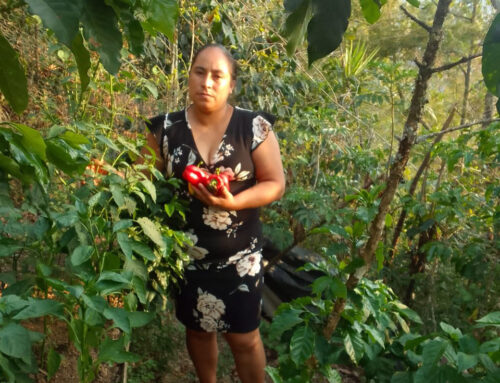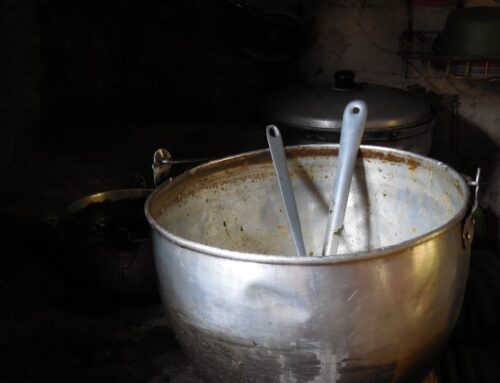Food 4 Farmers has a gifted board of directors who work diligently to further the mission of helping coffee farmers through the tough months of seasonal hunger. These “Thin Months” of food shortages occur every year, when income from coffee farming runs out, and when millions of families throughout Latin America cannot put enough nutritious food on the table.
We spoke with board member Kayd Whalen, Senior Vice President of InterAmerican Coffee. She has been importing and trading specialty green coffee for more than a decade. Kayd is Q Certified, active in the Specialty Coffee Association of America (SCAA), and the Coffee Quality Institute.
F4F: You’ve been working in coffee for more than a decade trading specialty coffee. How did you get started?
KW: I fell into it by chance. I started here with Elan Organic Coffees, which was a small locally owned business run by Karen Cebreros, which was acquired by InterAmerican Coffee in 2008.I’ve always loved coffee, so when I came across Elan in 2005 and found out that they specialized in high end, specialty, organic coffee, I knew I wanted to work for them. Even though they weren’t hiring, I convinced them to hire me anyway. Karen was such an inspiration. It was a small company in the beginning, so I was doing a bit of everything and got to learn really quickly.
F4F: At InterAmerican, what have you come to specialize in?
KW: The main thing I do is cup, buy and sell coffee. I also run the San Diego office, we have a team of 9 people here which is exciting and fun, it’s a great office. One of our main points of focus is bringing in direct trade coffees and helping roasters develop relationships with the supply chain. We take roasters who are buying coffee down to meet the producers, learn about them and understand the value of paying a higher price for a higher quality product which will help communities grow and flourish around the world. That’s what drives me and makes me excited about everything we do! And we do a lot of cupping.
F4F: I see that you’re a Licensed Q Grader. What prompted you to get certified?
KW: We cup here every day. We cup offers from all around the world, which means we are cupping a huge range of coffees, so it was important to me to get certified so I could give cohesive, objective feedback to our supply chain. It was also helpful to have a third party confirm that we’re on the same page with other cuppers when we’re at the cupping table.
F4F: How much work does it take to get certified? I know it’s a very difficult test.
KW: It’s pretty intensive. Luckily I was already familiar with the forms for grading coffee, so I felt confident about that part. I did have to practice quite a bit to be able to discern all the different nuances in coffee. It’s an intensive program, and exciting pass, because it requires a lot of work and dedication.
F4F: Is that how you got your nickname, “le nez?”
KW: Smell is a really strong sense for me. Everything I drink, everything I eat — even as a kid — I just have to smell it first. In coffee, I pick up quite a bit in fragrance and aroma. If there are any defects, I usually pick up on it within a second of smelling it. People think it’s funny, but I just have a really sensitive nose.
F4F: Tell us a little more about when you take your roasters to origin. Which roasters are you taking to origin and why are they going with you? Are they volunteering to learn about the process, and how do they react while they are there?
KW: I do a variety of different trips. For bigger roasters, I’ll go on a trip just with them and go to a very specific farm that they are already buying coffee from. We also do trips where we will take about 10 different roasters from smaller companies and visit 15 different farms in different regions and really talk about the big picture. It’s a very educational tool. We like to be transparent, and we like our customers and traders to meet the people we are buying the coffee from.
We also have a lot of customers who dictate who we visit. Some people already have a direct relationship with their coffee producers. Sometimes we will go back to the same co-op once a year with the roaster to show the impact of their investment in their coffee and give feedback. It’s really important to have that direct, clear feedback from the roaster to the producers. The producers also see that it’s not just us saying these things, it’s coming from their customers.
I travel a lot, and sometimes it’s hard to leave, since there’s so much going on here, but once I’m there it is such a breath of fresh air. Beautiful mountains, very peaceful and always educational, I’m always learning something new. Then when I get back I’m ten times more inspired to sell all of their coffees!
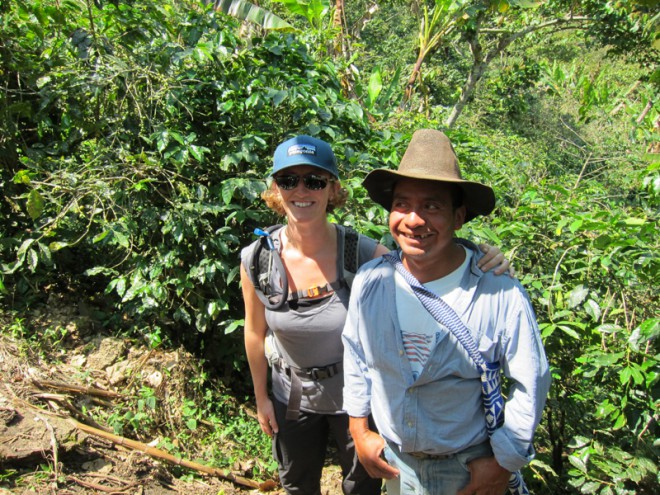
F4F: What was your first trip to origin? Did it change the way you thought about coffee?
KW: My first trip to origin was to Costa Rica with Karen and a group of different buyers. It was super enlightening. I had no idea how much work and how many people were involved in the process of coffee before I started at Elan. We stayed up in the mountains with coffee farmers in their homes, and that was just such an eye opening experience. I didn’t speak Spanish at the time, so I got to do a lot of sign language, and it was just really fun.
F4F: That’s fantastic that you were able to spend time with the community. It’s the best way to get a real flavor for the lives of coffee farmers.
KW: One morning I woke up with a cow’s head peeking through the drapes, it was hilarious! We were on the border of Costa Rica and Panama in a national reserve, just beautiful and remote. It was a really special experience.
F4F: When you have a new client who wants to learn more about coffee producers, how do you share your perspective on the lives of coffee farmers, and it fits into the business of coffee in the U.S.?
KW: A lot of people are just getting into coffee, and they’re not necessarily asking those questions, they’re asking about quality and end-product specifications. The best way is just to take people to origin. If you are a coffee buyer or coffee professional, I think it is so key to go and see for yourself. I’m seeing more roasters who are focusing on quality becoming interested in going to origin, it’s just a matter of us setting up trips and make it easy for them to sign up and go.
F4F: The trips to coffee regions can be pretty rough travel. How do people react to that difference?
KW: I’m very clear that it’s not a comfortable trip. We always bring roasters to a place that is safe, with a bed and running water. When we get to the farms it’s usually pretty rustic. The car rides are always longer than they say they are going to be. If someone wants an easy trip we can take them to Antigua or a couple other places. Some customers want to go visit a specific coffee farm that they buy from, but it could be 16 hour car ride to get there. So we just have to be clear what the trip is going to be like before it happens.
F4F: The roads in general are usually the hardest part.
KW: I was in Sumatra and they told us this one drive was going to be five or six hours, but it took us 20 hours.
F4F: That’s a really big difference.
KW: Sometimes it happens. Now we know not to do that drive in one day. It’s all a learning experience. I try to bring snacks for people and bring things that will help people feel more comfortable. I’m actually known for my snacks.
F4F: What’s your go-to snack?
KW: Everyone gets excited about these dry-roasted organic almonds. Fruit snacks, saltines and dried mango are also a big hit. You kind of have to be prepared for everything. I always have Cipro. If I could travel with a case of coconut water I totally would. I am known to always have snacks with me when I travel, which I think helps when you are traveling with people for the first time.
F4F: Yeah, and suddenly the organic special almonds become a really hot commodity.
KW: It’s like the best thing you’ve ever tasted.
F4F: What the most important thing about coffee to you, if you had to explain it to someone who didn’t really understand its importance to millions of people around the world? They just think of coffee as something they drink in the morning.
KW: The value of paying a higher price for a higher quality of coffee. Showing someone a quality coffee versus an average coffee and helping them understand the significance and value of specially coffee. If we can convince people to pay more for a better coffee, we can change the world in such a huge way. Appreciating the quality and being willing to pay for it is important to me. I think that is how the industry is going to change. Farmers have to be able to capture more return for their investment. It’s about improving the lives of all the people that grow coffee. To me, when people ask about specialty coffee, I love being able to say that I pay a fair price for the quality that I’m getting. The difference between a farmer getting a dollar a pound vs. three dollars is the difference between them investing back into their coffee, their family, education and food. It’s so important.
F4F: When did you first get involved with Food 4 Farmers?
KW: I’d been talking with Janice for a long time. I met her at SCAA in Anaheim, and she told me she was going to start something, and wanted me to be part of it. Knowing where my food comes from has always been important to me. With coffee, it’s understanding the community and the people that I’m buying it from. I’ve always been interested in how I can add value to the lives of producers. Food is such a basic need. If people don’t have food and water they are not going to be at their best. Promoting diversification is really important for farmers. If something happens to their coffee, they need to be able to feed themselves. When Janice came to me, I wasn’t sure if I had enough time to add something else to my plate at the moment, but I knew I wanted to help connect this organization to the coffee industry.
F4F: Connecting an organization or a non-profit to the right people is so important. Half the work sometimes is just finding the right person and getting that meeting.
KW: If I don’t have time to do anything else, I can do that. It’s a small part, but it’s something I can do to help.
F4F: Why do you think Food 4 Farmers’ approach to food security is successful?
KW: I love that it’s not about going into a community and deciding what needs to be done. I love the diagnostic, going in and identifying problems and finding solutions on a case-by-case basis. There’s never just one answer. It’s about everyone coming together to be part of the solution. Our work is to help the producers assist themselves.
F4F: What are your long-term hopes for Food 4 Farmers?
KW: It would be really wonderful if our entire supply chain could grow their own food and have the opportunity to diversify their food supply. To be able to feed their families year round. I’d love to be able to know that all the people we are buying coffee from are able to support themselves. Food, health, education, all those things. I think that would be awesome. It’s a big job.
